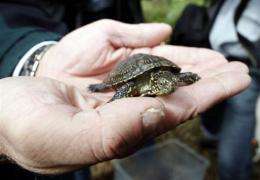Captive turtle found to have infectious disease

An Australian veterinary student said Monday she has documented the country's first known case of a bred-in-captivity turtle acquiring a highly infectious disease which could potentially spread to humans.
Debbie Bannan said the freshwater turtle had never been in the wild, but managed to acquire a mycobacteria, a pathogen capable of infecting animals and humans, which ultimately led to its death.
"How did it get mycobacterium? We don't know that," she told AFP. "How does it get to a turtle in a fish tank in a little kid's room somewhere?"
While there had been cases of this kind documented in the United States, this was the first of its type in Australia, she said.
"What was most concerning about this case was that the pathogen had never before been found in a captive aquatic reptile in Australia," she added.
Bannan, who will this week present her findings to the Australian Veterinary Association's Unusual and Exotic Pet conference in Sydney, said as the popularity of so-called exotic pets grew, it was important to raise awareness about the proper care of such animals.
"If these infections are getting into our homes, we need to know how to recognise and treat them before they spread to other captive animals and humans," she said.
(c) 2009 AFP

















